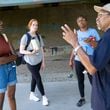A high school football season spent its last hurrahs at the Georgia Dome on Saturday. Without a lot of fuss, Jeremy Williams finished another one undefeated.
Williams hasn’t actually called a play since 2010, when his Lou Gehrig’s disease, also called amyotrophic lateral sclerosis, or ALS, made it physically impossible to coach any longer at small Greenville High, about 60 miles southwest of Atlanta.
Yet despite the relentless march of the neurodegenerative disease — he has lost all movement, he cannot speak, cannot breathe on his own, cannot take solid food — Williams in the last few months has stirred as many souls and spread as much inspirational seed as any coach in the field.
“I can still make a difference on this earth,” Williams said through the miracle of a computerized communication system.
“I can share the gospel of Jesus Christ. I can still coach. I can tell my wife I love her. And I can share knowledge and praise my beautiful girl and brave boy. I still have purpose.”
It is a partial pardon from the prison of his condition, this ability to type out words by passing his gaze over an electronic keyboard. His eyes and his mind are the two parts of himself over which he remains master, and Williams still can employ both to do what a coach is born to do: Deliver a message.
Just 43, Williams can’t live without the respirator that works his lungs. In early 2011 he made the decision to go on the machine and prolong his life, a step that some with ALS choose not to take.
How do you carry on?
He couldn’t hope to function without the care and support of his family: His wife, Jennifer, his two children, Josie, 13, and Jacob, 11, and the relatives by blood and marriage who provide constant care.
And almost as important to his continuing fight against a terminal disease has been the Tobii eye-gaze communication system. Without it, “I would probably not still be on this earth,” Williams said.
“Just imagine not being able to communicate and not being able to move. Your mind is bright with ideas and statements, but you have no way to express yourself. Being like that you have no worth,” he said.
He is wearing out that thing. The Tobii system can read what Williams types so painstakingly, and then give it voice. It comes out synthetically, in a unmodulated, computer-generated tone. The kind of speech associated with the most famous ALS survivor, Stephen Hawking. It is up to Williams to provide all warmth and personality with the phrasing he chooses.
The voice can boom, as it did last month when Williams took to the pulpit at Lakewood Baptist Church in Phenix City, Ala. Miked up, his words filled the sanctuary when he answered the question that everyone eventually asks: How do you do it? How do you carry on with ALS, a young son with spina bifida, a wife just coming off treatment for breast cancer?
“I got to the waist-deep water, and I decided that God (being) only waist deep was not enough. … You see I am drowning right now in God’s river and it is awesome. … I am over my head, not fighting the current, floating down the raging river with a smile on my face. That is how I do it,” he testified.
Williams’ borrowed voice can express his amusement when he notices the cheerleaders circling his son after Josie’s middle school volleyball game. “Jacob knows all the girls,” he said, his smile implied if not physically expressed.
It can reach out to the most hard-headed audience — one made up of teenage males. Before a heated rivalry game this fall between Griffin and Spalding high schools, both teams gathered to listen to Williams speak. The former coach was asked to come in and share views and perspectives that might help tamp down any hostilities between the players.
“I thought he had a unifying effect on us,” Jarrett Laws, Griffin’s coach, said.
“It was a tough message. He has no time for whiners, no time for crying or feeling sorry for yourself,” Laws said. “Athletically, he told them to fight and fight until you can’t fight any more — and then fight some more. From a morality standpoint, he said this (football) is bigger than us, to be used for something beneficial. The guy is always reaching toward heaven.
“It’s life-changing when you listen to him, his positivity about how God has used him.”
Whatever the venue, the voice does tend to stay with you, more so when considering the effort that it requires to produce a 30-minute sermon, letter by letter, with only careful eye movement.
While shopping on the day after Thanksgiving, a young girl recognized Jennifer and her daughter from the Sunday sermon in Columbus. “She told us, ‘I just want you to tell your husband what an influence on me he is,’” Jennifer recalled. “She said, ‘I complain about getting dressed in the morning then I look up there and it has taken him hours to put together this message for Christ. It makes me want to get up and do something and not say a word about it.’”
Family trials multiply
People have been plugged into the Williams’ family story for five years now, dating to a series of AJC stories chronicling his 2009 season at Greenville and the onset of ALS, a documentary film, an appearance on “Extreme Home Makeover” and a book.
As 2014 began, the family faced a new series of challenges. Jennifer was undergoing chemo for breast cancer. Wheelchair-bound with spina bifida, young Jacob struggled with an infection that required hospitalization in the summer.
“It was the hardest two things I have ever dealt with, and I have dealt with a lot,” Jeremy said. “‘Mess with me, I am a man,’ is how I felt. Do not mess with my wife or son. But Jennifer and Jacob both handled their trials with unbelievable character, strength and grace.”
At year’s end, though, Jacob was back full-time at school, and his mother heard the words “cancer free” in June. Her hair grew back, much curlier than before. “I will never have another bad hair day again,” she said, laughing.
Of his own health, Jeremy said, “Other than ALS, I am in good condition. … I still get tired easy but I will keep fighting.”
Autumn has been something of a reprieve, a rare period of relative calm around the Williams house. Time for the family to venture out to Josie’s volleyball games, for Jeremy and Jacob to sit in the deer stand behind their home and watch the wildlife, for Jeremy to compose his messages and deliver them in person.
“It has been a very sweet time the last couple months because it’s like we’ve had a chance to sit back and take a deep breath,” Jennifer said.
Throughout the everyday runs the subtext of Jeremy’s disease, incurable and ultimately deadly. That specter is always there.
He faced death from the outside in October when a roommate and teammate from his college days at Memphis State — himself a high school football coach in Alabama — suddenly died.
At the funeral, Williams spoke again. As he did, he looked out on his friend’s family, whose two children were about the same age as his own.
His thoughts wandered and because of a miracle machine, they were not held captive.
“I could not help but to picture Jennifer, Josie and Jacob sitting there for my funeral. It really touched my heart,” he said.
“The message I got afterward is that we are not promised another breath on this earth. I want to have everything taken care of so Jennifer does not have to make any decisions. I want Jennifer and the kids to enjoy my celebration of life. It will be a party not a funeral because I will be hugging Jesus.”
About the Author






